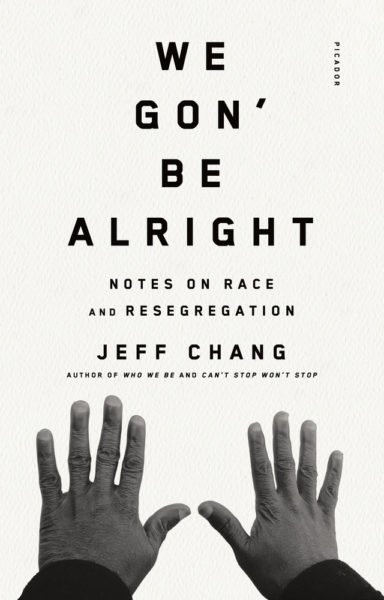 Author of Can’t Stop, Won’t Stop and Who We Be, Jeff Chang’s latest book We Gon’ Be Alright: Notes on Race and Resegregation is an incisive series of essays looking at race in America. Drawing on recent events, including Donald Trump, Black Lives Matter, and #oscarssowhite, Chang outlines a contemporary crisis around issues of race, division, and a repeating cycle that needs to be halt. We Gon’ Be Alright is, at its heart, a call to action. But it is also a call for thoughtfulness and an understanding of how we got to where we are. If Who We Be took that history and went deep into it, this latest series of essays takes the current moment and draws it out to explain where we are, the conversations we are having, and the ones we should be having.
Author of Can’t Stop, Won’t Stop and Who We Be, Jeff Chang’s latest book We Gon’ Be Alright: Notes on Race and Resegregation is an incisive series of essays looking at race in America. Drawing on recent events, including Donald Trump, Black Lives Matter, and #oscarssowhite, Chang outlines a contemporary crisis around issues of race, division, and a repeating cycle that needs to be halt. We Gon’ Be Alright is, at its heart, a call to action. But it is also a call for thoughtfulness and an understanding of how we got to where we are. If Who We Be took that history and went deep into it, this latest series of essays takes the current moment and draws it out to explain where we are, the conversations we are having, and the ones we should be having.
What today’s activists, organizers, and artists are giving us are new ways to see our past and our present. Even more, they are giving us the directive to address inequality and inequity now–to make it clear that if we do not do so, we will continue to be drawn back into the bad cycle, just as we were after 1954, and after 1992. Right now we have the opportunity to get it right. Our shared future depends on it.
We Gon’ Be Alright is full of contemporary examples that resonate particularly strongly today in this current moment, yet the larger cycles that Chang points out to unfortunately mean that these thoughts and lessons may remain relevant for a long time. But the imperative for change underlies this series of essays. Each well researched, the progression of topics provides both the information of what happened (for example in Ferguson, or with #notyourmule), context, and insightful analysis. There are the building blocks for continuing the ever-important “race conversations,” for advocating for arts and culture and life that are equitable, for taking action against resegregation. Some of it will be new ground for many, but that’s part of what makes this book such a resource. I myself was floored by some of Chang’s research on arts funding, on the history of housing and neighborhoods in Ferguson, and countless other topics.
The last of the essays is a reflection on the place of Asian Americans within the American racial picture, past, present, future written in the second person “you.” Notably different from the preceding essays in tone and style, it feels deeply personal and an attempt to honestly look at and question all the complications of our position. Whereas Chang feels like the expert in the other chapters, here, he exposes another side.
What does it mean to be the evidence that racism is not real? To be fetishized by colorblind liberals and white supremacists alike? To be so innocuous that teachers and policemen and figures of authority mostly allow you the benefit of the doubt? To be desired for your fluid, exotic, futuristic, yielding difference?
Rich in so many different ways, We Gon’ Be Alright should be required reading. Small in size, it’s a giant in content–thought-provoking and unflinching.








